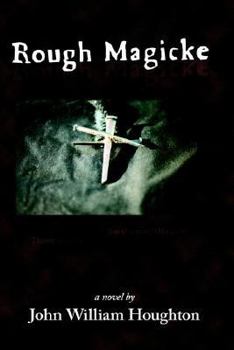Rough Magicke
A co-publication of Harvardwood Books and Unlimited Publishing LLC, this novel is a remarkable witch's brew of supernatural, Christian, classical and scientific arcana, served up at an all-too-real... This description may be from another edition of this product.
Format:Paperback
Language:English
ISBN:158832124X
ISBN13:9781588321244
Release Date:April 2005
Publisher:Unlimited Publishing
Length:410 Pages
Weight:1.45 lbs.
Dimensions:0.9" x 6.0" x 9.0"
Customer Reviews
1 rating
More Things in Indiana Than Are Dreamt Of In Your Philosophy
Published by Thriftbooks.com User , 19 years ago
The advance blurbs on the back of this remarkable genre-straddling novel (more accurately: three novelettes) make reference to Charles Williams and G. K. Chesterton, and quite rightly so; but good arguments could be made for Dorothy Sayers and Madeleine l'Engle as additional godparents. Why is this book remarkable? Because in it, Christianity and magic coexist without shame or apology, in a way that hasn't happened in popular fiction (at least, in popular fiction with a contemporary setting) in decades, and in a way that is probably counterintuitive to current Anglophone majority popular culture (but would have been perfectly normal in the Middle Ages). It's nice to know, for instance, that there are alternatives to Phillip Pullman out there: that a narrative can be fantastic (and contain demons and angels as characters) without taking potshots at religions, be they Christian or any other. The Marion Zimmer Bradley formula (All Christians are prudes and witch-burners, all pagans would fun to party with) is avoided as well: magical skills are inherited rather like musical ones, irrespective of religion. (Houghton's narrative shows particular respect to Native American religions and to Judaism. There is some scorn for certain types of neo-paganism, though not all of them. Most surprisingly, that variety of Christianity we most often see made fun of nowadays -- revivalist evangelism -- does get beaten with a few stripes, but comes out fine in the end.) Houghton's paranormal detective hero is Jonathan Mears, an Anglican chaplain at a military school in Indiana (modeled on the Culver Military Academy, of which the author is an alumnus, and which is [judging by its website] quite pleased with the novel), and later the bishop of an Anglican diocese in the same state. Military schools aren't a venue with which I am familiar, and sometimes the one in this book seems overpopulated with too-clever-by-half adolescents in uniform (like so many Miles Vorkosigans), inhabiting some kind of Austro-Hungarian neverland, complete with matching music (Franz von Suppé) and a wardrobe from the old Sissi movies of the fifties; but it is a vividly imagined world (to me; maybe Culver is/was really like this) that eventually wins the reader over entirely. All three of the stories are engaging, particularly the third, which has a delicious villain and a stunning conclusion, featuring unexpected guests out of the past plus a surprising and satisfying star turn from a previously minor character. (Think Yoda's duel with Count Dooku, and you'll get the idea; although sabers don't feature in the scene.) Another goosebump scene is the"Jeff's a psychic, Chaplain Mears says prayers, and Larry's a nudist" sequence from the middle story; which also includes a passage in a monastery ("We did horrible things - I can't say") that is reminiscent of the scariest parts of C. S. Lewis' That Hideous Strength. (I'm carefully not spoiler-ing, for readers of this review who may b






